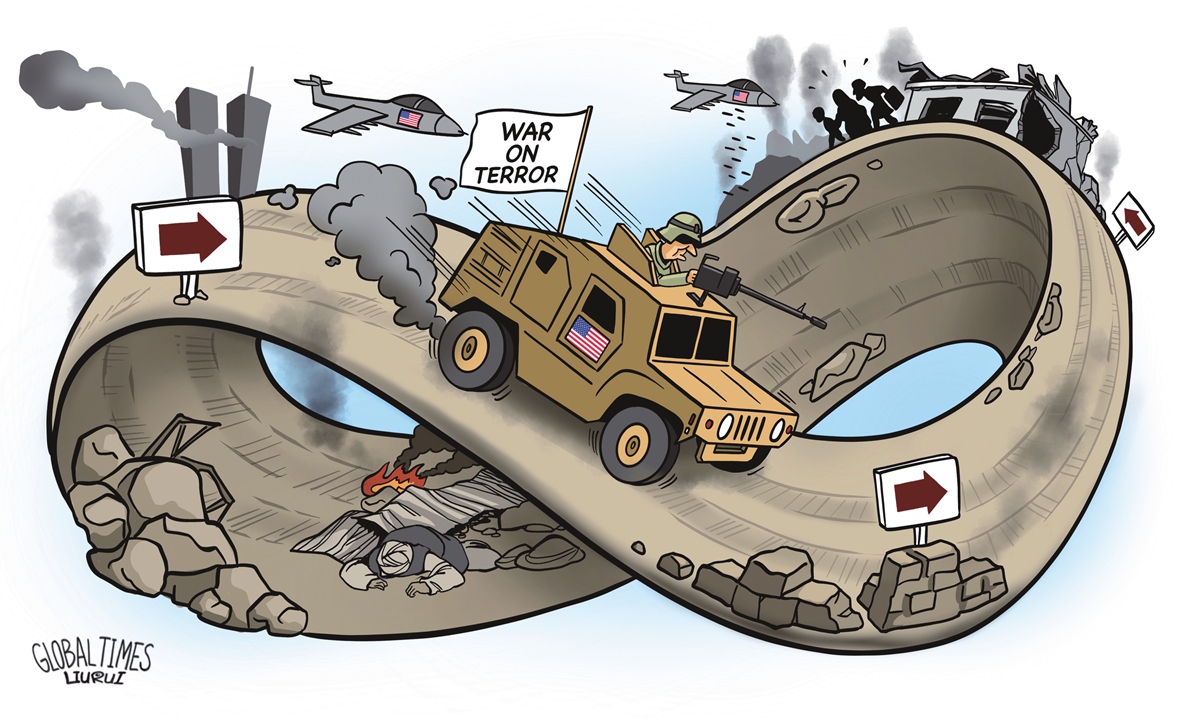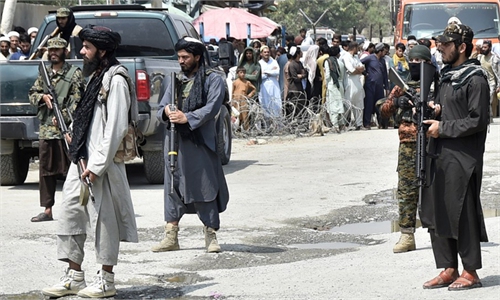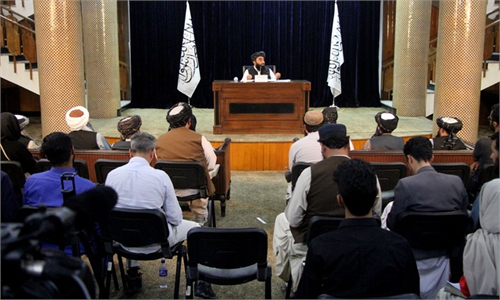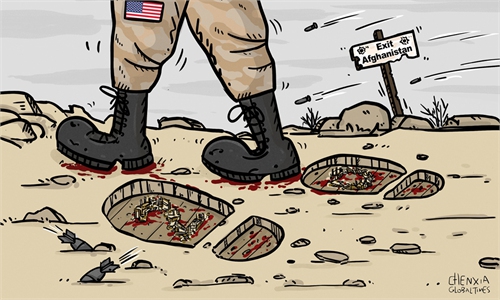
Illustration: Liu Rui/GT
US' "20-year war" has come to an end, costing billions of dollars and causing hundreds of thousands of casualties among the Afghan people. What can the US learn from this? What lessons have been learned? Will it happen again? These issues not only question the conscience and wisdom of current and future US politicians and voters, but have also attracted the attention and concern of the international community.
Since the end of World War II in 1945, mutual respect for national independence, sovereignty and territorial integrity has become a universal fundamental norm in international society. In theory, any country that tramples on this red line will pay a heavy price.
For the US, however, the principle of respect for national sovereignty has long been eroded by the "Japanese-German myth." It refers to the fact that after the World War II, US troops were stationed in Japan and Germany. These were the two countries where World War II originated, and yet they have moved forward and carried out institutional reforms.
On the whole, the transformation was a success. The two countries fully embraced and internalized the political systems that the US had forced from outside. They also became important allies of the US in the Asia-Pacific and European continent. Japan and Germany, whether willingly or with internal differences, at least objectively surrendered part of their sovereignty and accepted long-term foreign military presence. This was done in exchange for the protection and support of the US. It was deeply integrated into the hierarchical international system as "spokes" with the US as the "hub" at the core.
More broadly beyond Germany and Japan, all NATO countries in Europe and other "major non-NATO allies" in the region were substantial "semi-sovereign states" because they received varying degrees of US military protection. They also hosted varying numbers of US troops. They followed Washington with international affairs, moving closer to the American position.
Yuen Foong Khong, a professor at the Lee Kuan Yew School of Public Policy at the National University of Singapore, states that hierarchy is an American tributary system.
It is the generally successful operation of this modern version of the tributary system over the past 70 years that has given contemporary American policymakers the institutional ego that has induced them to engage in a series of "strategic recklessness" over the last two decades. This has resulted in the present day's suffering.
For 20 years, the US with its military forces abroad and its intelligence agencies, as well as the NGOs that they supported, were almost invincible in their efforts to "destroy the old world." Almost none of the targeted countries in the Greater Middle East survived with the exception of a few countries such as Iran - only with the support of friendly countries outside. Former heads of toppled countries and regimes, some of whom, like former Egyptian president Hosni Mubarak, were longtime key US partners.
This shows that US allies in the Middle East are also doomed to fall into losing power, exile and even death. The "great success" achieved by the US army in this destructive work undoubtedly stimulated the subjectively capricious power and strategic advance of US presidents such as George W. Bush and Barack Obama in the past 20 years.
However, in the aspect of "building a new world," it has been a lose-lose result for the "regime-changed" and "democratized" countries and their people. It has damaged the US and the American people themselves. In Afghanistan, for example, the government's last president, Ashraf Ghani, was an expert on nation-building who has been trained by the American higher education system. Ironically, Ghani is the author of the book Fixing Failed States: A Framework for Rebuilding a Fractured World. Instead of standing with his own regime and people, Ghani took hundreds of millions of dollars and fled his motherland.
Afghanistan is not alone. Similar and even worse tragedies have been played out in Egypt, Libya, Syria and Tunisia. What may shame the American strategists most is the sad reality that when the new "democratic" leaders have been supported by the US and came to power through "Color Revolution," they soon stumbled. Their countries are likely to become even more religiously conservative, politically populist and internationally anti-American, compared with their "authoritarian" predecessors. The current and future decision makers and national security advisers in the US may have to rethink these phenomena in-depth.
In the current case of America's "Hard Afghanexit," the logical strategic doctrine may well be the latter. This is not to say, of course, that future American strategists will not wage new wars. However, inside American policymaking circles, members of Congress and voters are likely to be more prudent in deciding on the next military intervention abroad. They might be at least more pragmatic than the patriotic and democracy-missionary impulses that were inspired by the 9/11 attacks 20 years ago.
American troops have left. Farewell and have a pleasant journey.
Indeed, as Chinese classic Zuo Tradition: Commentary on the "Spring and Autumn Annals" reminds: This is your beginning, and so this will be your final end. Remembering the past is the teacher of the future. Can Washington really learn these history lessons? The world will wait and see.
The author is director of Research Department, Center for International Energy and Environment Strategy Studies, Renmin University of China and Distinguished Research Fellow at the Center for American Studies, Zhejiang International Studies University. opinion@globaltimes.com.cn




